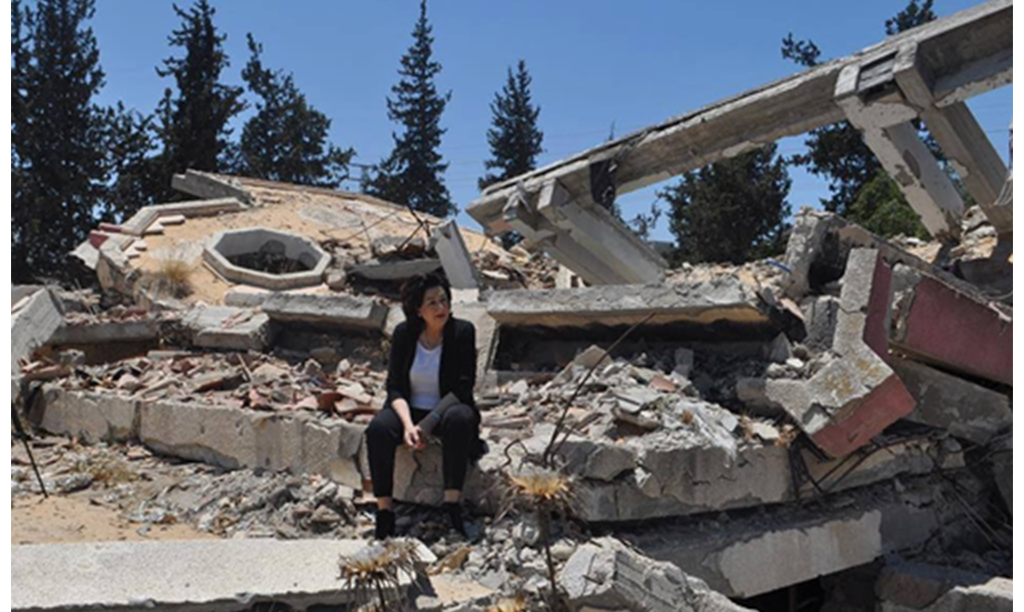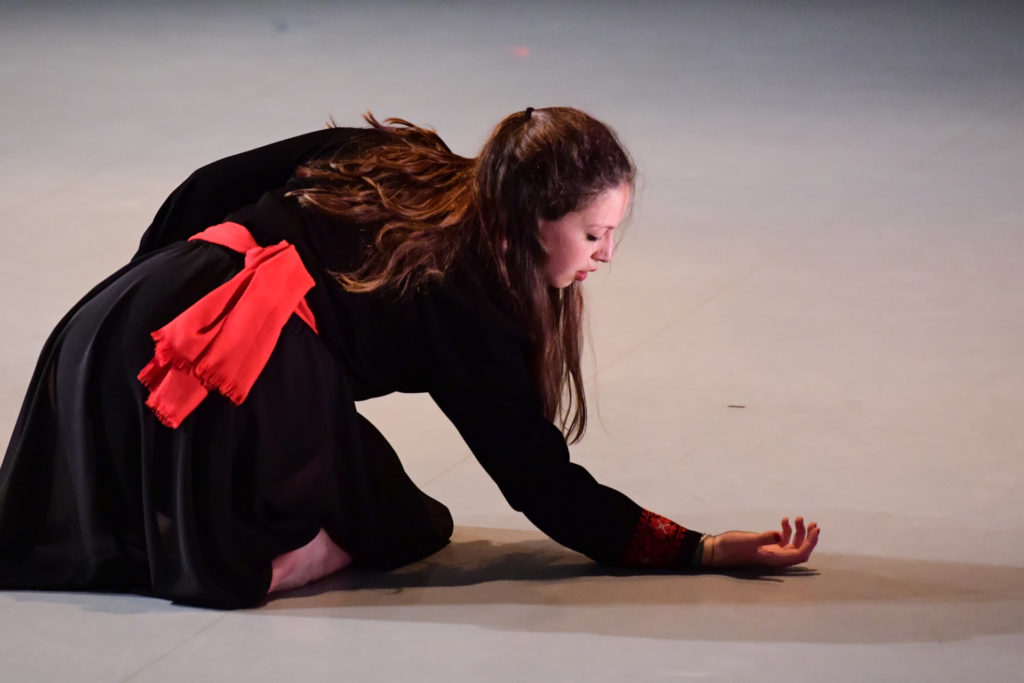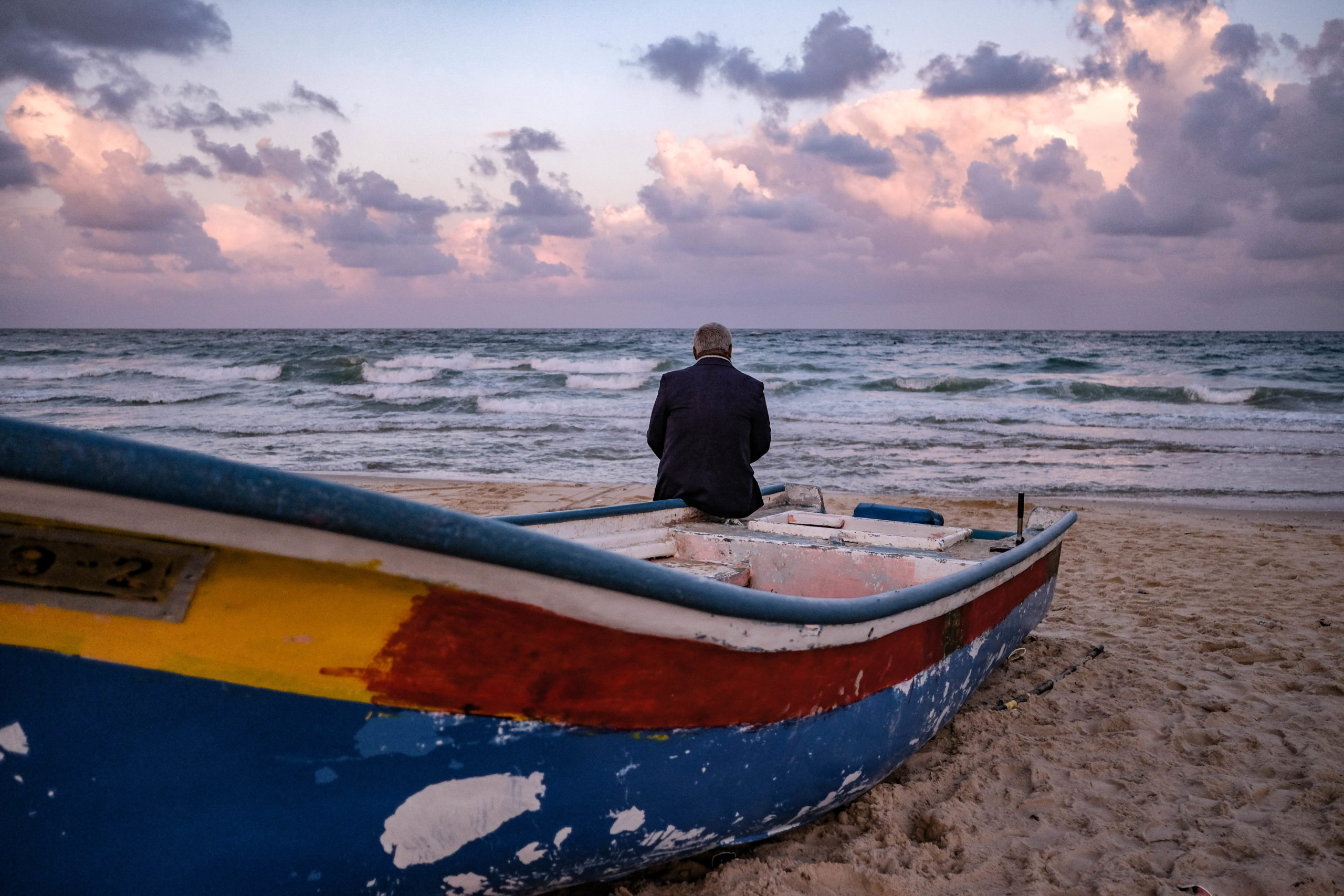I have only seen my father cry twice. The first time, I was eight years old, and we were driving up to Boston, a trip we made every year at Christmastime to visit my mother’s family. My father was blasting Fairuz in our 1995 Volvo station wagon; her balmy voice seemed out of place against the relentless miles of icy, cracked highway and gray New England frost. My father sang along until his baritone voice cracked and his shoulders began to quiver. My mother reached over, ruffled his hair, and turned around to wink at me and my sister in the back seat.
“Baba, why are you crying?” I asked, leaning forward to catch a glimpse of him. “It’s just some old lady singing!” I don’t remember what he said.
The second time was several years later in 2008. My father sat at the edge of his bed in our cramped, old New York City apartment, gripping the TV remote and staring at the screen with his brow furrowed. Israel had just launched Operation Cast Lead, which would devastate the Gaza Strip. Images of piles of dead bodies, explosions, and mounds of rubble flashed across the screen, scenes my parents wouldn’t even let me see in movies.
My father eventually stood up. He rolled up his sleeves and approached the TV screen like it was a window that he could pry open and climb through. But all he could do was grab the house phone and try calling his sister, who lived in Gaza City, to see if she was okay. Each time he would get her on the line, she couldn’t hear him.
“Hello?” I could hear her say, over and over again, her voice muffled by the distance. “Is anyone there?”
“Rawya!” he called. “I’m here. I can hear you. Can you hear me?”
I remember what he said to me that night. Eventually he pulled me over, pointed at the small TV screen, and, with the same shaky voice I had heard in the car years before, said, “That’s our home, baba.”

Until then, I had never thought much of what “home” meant, and as a 13-year-old, I rarely had to explain my background. We moved around a lot back then, and whenever anyone asked where I was from, I would shrug and name wherever we had just left. But after watching the destruction of my father’s home on TV and seeing the ruins of my aunt Rawya’s house, I started associating “home” with a place I had never lived in — a feeling I would later realize I share with millions of other members of the scattered Palestinian diaspora.
I was born in New York City, and although I spent several years living in countries across the Middle East, I only spent a short few months in Gaza and was far too young to remember it. I grew up listening to my father’s stories of what it was like “back home” — of clementine and olive trees, boys who sold dates on the beach, and, of course, war and occupation. Despite my physical distance from Gaza, it came to occupy an almost daily presence in my life, but it was Israel’s 2008 invasion that made me cognizant of the forces actively trying to erase part of my heritage, albeit far removed and unfamiliar.
From then on, I began calling myself Palestinian. I translated song lyrics to tie together my broken Arabic, read every history book on Palestine that I could get my hands on, and became deeply involved in advocacy for the Palestinian cause — the decades-long struggle for basic human rights, self-determination, and an end to Israeli occupation. Above all, I came to yearn for a “return” to the elusive home I had heard so much about over the years, and now, I am the one who can be brought to tears after hearing a few lines of the poetry of Mahmoud Darwish or Tawfiq Ziad.
But how could their words, so intimate in their claims to the land and lives they lost, resonate with me — someone whose only connection to Palestine was through the stories I’d been told?
Nostalgia is a yearning for the past, or an embellishment of a bygone time, sometimes justified but, more often than not, tinted by positive associations and the subconscious filtering out of the darker moments. Our imaginations, eternally unsatisfied with present reality, tease us with false memories of what actually was; we often make the past seem larger than life, better, maybe even somehow synonymous with an ideal future.
But how can one long for a past they’ve never experienced?
Aya Razzaz was born in Boston but spent most of her childhood growing up in Jordan before she continued on to college in the United States. Her mother, Susan, is from New Jersey, and her father, Omar, is Palestinian Jordanian, but he has never lived in Palestine. After studying dance and choreography in college, Aya moved to Philadelphia, where she now teaches dance lessons at a local studio.
“For my final thesis in college, I choreographed a dance piece based on the physical sensation of Palestinian and Syrian displacement and the experiences of my family and refugees I met growing up in Amman — what it’s like not having a rigid tie to where home is,” Aya said. When I asked her to tell me more about the projects she’s been working on, she smiled.
“There’s this one project I’ve been thinking about a lot lately,” she said. “I love being in water, I love being in the ocean. It always felt so amazing to me. I was talking to my dad about it recently, and I was like, ‘We’ve lived in Amman our whole lives, there’s no water around here!’ But then he told me that my Tayta (grandmother) had a very strong relationship to the ocean in Gaza. Maybe it’s something she passed down to me — a longing for the ocean.”

Aya has never been to Gaza, but her love for the ocean echoes a common sentiment of the city’s inhabitants. The beach embodies an opportunity for escape for millions of Gazans who live under the Israeli and Egyptian blockade. It provides a primary source of livelihood for the fishing crews that brave trigger-happy Israeli gunboats on a daily basis, a hangout for the city’s restless youth, and a chance for brief reprieve from the suffocating sense of confinement under occupation. It also always seemed to be a constant theme in the stories Aya’s Tayta would tell.
“I want to explore the connection people in Gaza have to the water,” Aya says. “I want to explore why they’ve developed such a deep relationship with it and how that ties into my nostalgia that I hold on to so dearly.”
Perhaps this “imagined nostalgia” is common to all dual identities, an inevitable symptom of competing cultures in identity formation. However, for Palestinian Americans, just one extension of the scattered, fragmented Palestinian diaspora, it feels more complicated. It is overshadowed by the ongoing struggle for recognition in what remains of Palestine itself. Palestine’s “borders” continue to recede every day, Israel’s occupation has only tightened, and the world seems to have turned a blind eye.
Our dedication to our identity becomes defensive when confronted by those who actively try to erase us by claiming “Palestinians don’t exist” — a line that has become a central rallying cry for the defense of the settler-colonial state whose very existence depends on our exclusion and erasure. For some, the response is to double down on our identities, despite the distance, and inevitably fill in the blanks where we need to.
It’s almost as if we enthusiastically commit to the obligation to engage in an existential political struggle on behalf of a community we belong to conceptually but that is always just out of reach and perhaps to some extent even utopian. We willingly adopt the sensations and expectations that have been passed on to us.
“Every day, we carry that intergenerational trauma because we feel the pain from our parents and our grandparents who tell stories of displacement and injustices that will never be corrected,” Diana Nabulsi says over the phone, the sound of a busy kitchen in the background.
Diana was born in Chicago and spent most of her childhood growing up in Midland, Texas, but her parents are from Jerusalem and Nablus. I met her after starting graduate school at Columbia University, having begun the same program she had graduated from just a couple months earlier. I had heard a lot about Diana before I had even met her. During her time at Columbia, she was president of the Palestine Working Group, a student organization that provides education and advocacy for the Palestinian cause, and she gained a reputation for never being afraid to speak up and confront those who tried to silence Palestinian voices on campus.
Diana has had to defend her identity all her life.
“The blatant and raging racism in Texas was pretty hard to ignore while growing up,” Diana said. “I was told my whole life that Palestine doesn’t exist, Palestine is just a figment of my imagination. They called me a terrorist.”
In the face of contradictory efforts to deny her identity and simultaneously attack her for being Palestinian on a daily basis, Diana doubled down.
“I made sure everyone knew I was Palestinian. If they had a problem with it, they could say so to my face,” Diana said with a laugh.
But living almost constantly on the defense, the relentless pressure to prove her identity took its toll.
“It can be exhausting being Palestinian,” Diana said. “Don’t get me wrong, I don’t mind going against the current. I actually prefer it because it gives me life. But it was emotionally exhausting, and I’ve reached several points of burnout.” At one point in high school, the bullying, suspicion, and hate became so overwhelming that Diana moved to Dallas in an attempt at a fresh start.
Yet, no matter how hard it gets, Diana insists that her aspirations will always revolve around Palestine, introducing a new dilemma for her: Now she must find a way to balance between the life she has built here and her hopes to return to Palestine one day.
“My lifelong goal has been to move back and get a piece of land in Palestine and open up an animal shelter,” she says. “But I don’t know if I can because my fiancé is an anesthesiologist here. His entire career is here.”
How do we decide where to grow our roots? Today, the Palestinian diaspora has grown to over 7 million, which includes the descendants of those who were forced from their homes in 1948 during the Nakba as well as those like me, Aya, and Diana, whose families were lucky enough in a sense to decide for themselves to leave and establish lives far away from military occupation. Although our experiences diverge, we share a common resolve to return, only strengthened by the counterforces that push us away. Many of us are prevented from even visiting Palestine by Israeli authorities who call us security and demographic threats for our activism and rightful claims of displacement.
I last visited Palestine in 2016. It was my first time back in years, so I did not know what to expect when I tried crossing over to the West Bank through Jordan’s King Hussein Bridge. I deleted all my social media accounts, erasing any proof of my activism, anything that could give the Israeli border guards pretext to turn me away. I dropped off my Arabic books at my cousin’s apartment in Amman, shaved my beard, and wore my bright red Rutgers University T-shirt, all part of my plan to play the role of an innocuous American college student. I took a taxi to the crossing at 7:00 a.m. to try to beat the crowds, but everyone else seemed to have the same idea.
“Want me to wait for you?” the taxi driver asked as we pulled up to the buses shuttling people back and forth through clouds of dust.
“No, thank you,” I said.
“Take my number just in case,” he insisted.
The border crossing felt like a bullpen. Heavily armed guards, some in oversized green military fatigues and others in civilian clothing, stood in the shade smoking cigarettes and watched as we shuffled off the buses and rushed into what looked like a dilapidated airplane hangar.
“Shawa?” the Israeli border guard grunted at me as he looked up from my American passport in surprise. “You are Arab?”
“I’m Palestinian American,” I replied.
“Then go over there,” he said, pointing me to a long line leading to a heavy metal door.
I was interrogated for hours, strip searched twice, and forced to unpack and repack my bag while a soldier, who looked no older than I, searched through every article of clothing, every pocket, every corner. By sunset, I came out confident that the Israeli authorities now knew more about me and my family than I did. And it was all for nothing.
“We’re not letting you through today,” said a uniformed officer after he asked me, for what must have been the 10th time, what my plans were in Israel and if I or my family had ever been in contact with members of Hamas.
“Why not?” I asked. “I’ve been here all day and you’re not going to let me in because I’m Palestinian?”
“I don’t know what that is,” he replied, almost as if waiting for a chance to say it. “Border is closed.”
I was glad I took down the taxi driver’s number; he did not sound surprised when I called. He even agreed to drive me back in the morning to try the crossing again, and after another almost identical day of inane interrogations, I was lucky enough to make it through.
While I hope to return to Palestine, thousands of Palestinians my age are desperate to leave, and for good reason. In Gaza, growing poverty rates, the persistent threat of war, and the seemingly endless Israeli blockade has made life unbearable for so many young Palestinians. Why would I, with all my privilege, want to go where they cannot leave, no matter how hard they try?
For many of us, the “Palestine” we have grown attached to is simply not there waiting for us. Just as some Palestinian refugees still cling on to the heavy, rusty keys of homes they were expelled from in 1948, hoping to return some day and find life as they left it, we all adhere to an idea that is just as illusory today, a vision constructed not around reality but around the stories passed down to us and a unified political struggle that has shaped our perspectives. The truth is, what we hope awaits us, just beyond the heavily armed soldiers who turn us back at the border or the contemptuous airport security who gleefully send us packing, may simply not exist.
Almost as if set up for disappointment, precluded from a sense of closure we are actively barred from reaching, we are instead forced into itinerancy, disconnect. Am I Palestinian American or just American? Can I claim to be Palestinian if I have never lived there long enough to call it “home?” Can I claim it if I have never personally shared the day-to-day struggles of life under occupation that encapsulates so much of what it means to be Palestinian? We are pressured to choose a uniform identity and stick with it, but we will always be unable to fully immerse ourselves in either identity, excluded from being fully Palestinian by our physical separation, yet desperately pursuing it all the same.
Where do we go from here? And what is it that we want? We want to be able to see and experience the “home” we have heard so much about from so many different angles so that we can finally justify our own perceptions. But more than that, our nostalgia has established a through line that has come to shape our personal aspirations and, more importantly, gives us a sense of purpose. I hope that by sharing our mutual nostalgia, imagined or otherwise, we can unify our diaspora community in our efforts to end the occupation and find an answer to the Palestinian question. And someday, my father can show me his home no longer hidden behind the walls of occupation and blurred by my imagination.



